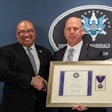More than 60 officers attended an Active Shooter Panel discussion at TREXPO East, participating in a lively discussion of how to respond to lone gunmen, coordinated attacks, and even terrorist incidents.
PoliceMag.com SWAT columnist and retired Cleveland SWAT sergeant Robert O'Brien served as moderator for the panel, which included Don Alwes of the National Tactical Officers Association (NTOA), John Benner of Tactical Defense Institute (TDI), Bob Gallegos retired from LAPD SWAT, and Ron McCarthy of R.M. McCarthy and Associates and a founding member of LAPD SWAT.
Topics covered by the panel included active shooter response by patrol officers, the role of SWAT in active shooter incidents, and the need for law enforcement administrators and executives to trust the capabilities of their officers.
"Active shooters are a tactical officer problem, not a tactical team problem," O'Brien said opening the discussion.
After O'Brien's introductory comments, each of the panelists discussed his key concerns about active shooter response and answered questions from the audience.
Benner addressed the need for citizens to take more responsibility for their own security. "I think we need to be perfectly honest with citizens," he said. "We have a 20-minute to 30-minute response time. It's over by the time we get there."
Alwes stressed the importance of one officer taking the initiative and distracting an active shooter or even a terrorist team from its main goal of killing as many people as possible. "One officer can make a difference," he said. "[Even if you are being attacked by a team of terrorists], one person can keep them from fortifying or from massacring people. Get into the fight and make them fight you."
Gallegos also focused on the role of the individual first responder. "You have to draw that line in the sand and take care of business," he said.
McCarthy said that his greatest concern was the way that agency executives damage officer morale by expressing a lack of confidence in the capabilities of their personnel. "You cannot expect officers to be brave and do brave things if you haven't given them the equipment and training to do so," McCarthy told the attendees.
Expanding on the need for first responders to be well equipped, McCarthy said that if he was a police chief every patrol car in his agency would have a soft ballistic shield. He also agreed with the other panel members on the need for officers to have patrol rifles.
McCarthy argued that officers need to have 600 rounds of ammunition in magazines in the trunks of their cars. "That's a burdensome amount, but it's what you will need if you get into a sustained gunfight with multiple suspects," he explained. "If you don't have the rounds to protect yourself, you're going to lose."
One of the most lively discussions during the event centered around fears of "blue on blue" friendly fire incidents. All of the panelists agreed that officers need to have a way to identify themselves to other responding officers should they have to take action against an active shooter while off duty or in plain clothes.
During this discussion, audience member Mike Lessman of the Reno (Nev.) Police Department showed his new invention, the DSM Safety Banner. The DSM, "Don't Shoot Me," banner comes in a belt-ready pouch. The reflective sash-style banner can be drawn with one hand during a gunfight and has "Police" in white lettering on the front and back. It sells for $30 and is available at www.DSMsafety.com. Lessman said that he is only taking orders from law enforcement agencies to ensure that the product is only available to officers. Another model is available for civilians with concealed carry permits.
The Active Shooter Panel event was only planned for two hours, but the audience was so interested in the topic that it was extended 35 minutes.
Closing the session, Gallegos advised the audience, "Train hard because the day will come."












